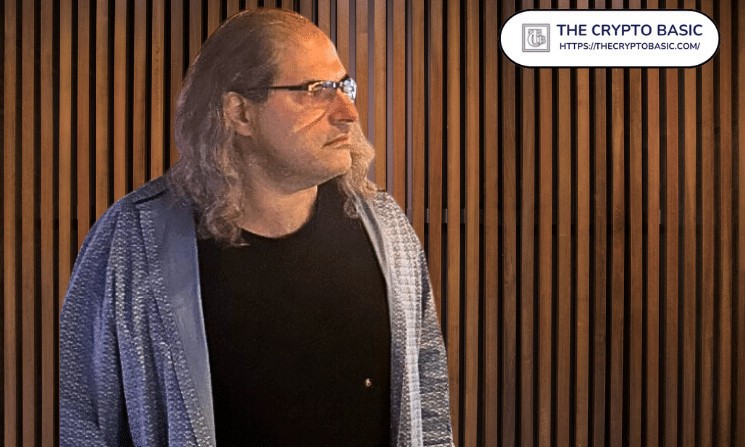Ripple CTO Says XRPLF Has No Enforceable Right to Decide Who Can Run a Validator

Ripple CTO clarifies XRPLF’s lack of authority in determining XRP Ledger validators, raising debates on decentralization in the crypto community.
The chief technology officer (CTO) of Ripple, David Schwartz, has clarified that the XRP Ledger Foundation (XRPLF) has no enforceable right to decide who can and can’t run a validator on the XRP Ledger. The XRPLF serves as an autonomous nonprofit organization dedicated to fostering the advancement and adoption of the XRP Ledger.
Schwartz’s latest comment follows the crypto community’s continued argument and controversy over the XRP ledger’s decentralization, especially as it pertains to XRPLF’s role in defining node operators in the default Unique Node List (dUNL).
Taking to Twitter, David Schwartz, who is one of the original architects of the XRP Ledger, stressed: “XRPLF has no enforceable right to decide who can and can’t run a validator on XRPL. If they did, I would never argue that XRPL is decentralized.”
XRPLF has no enforceable right to decide who can and can’t run a validator on XRPL. If they did, I would never argue that XRPL is decentralized. If you don’t like XRPLF’s decisions, they can’t make you listen to them. 1/2
— David «JoelKatz» Schwartz (@JoelKatz) May 25, 2023
The CTO’s remarks implied that any centralized control over validator operations could undermine the core principles of decentralization that the XRPL network aims to achieve.
Highlighting the importance of individual autonomy, Schwartz added, “If you don’t like XRPLF’s decisions, they can’t make you listen to them.” This statement alluded to the notion that users and participants in the XRPL ecosystem have the freedom to disregard decisions made by the XRPLF if they disagree with them.
If you ever had some real dispute over network governance, you’d have to produce your own code anyway that enforces your preferred side of the dispute. It can change whose UNL is the dUNL with just a one-line change added to the others. 2/2
— David «JoelKatz» Schwartz (@JoelKatz) May 25, 2023
What Does the Community Think?
In a similar conversation, the Ripple CTO sought the crypto community’s view about what makes blockchain technology 100% decentralized. ‘Can something be properly described as “100% decentralized” if one single party has the legal right to decide who can use it, how they can use it, and how it can be changed?’ he asked.
Interestingly, most of the respondents, about 47%, answered “No,” while only 9% of them gave an affirmative response.
Can something be properly described as «100% decentralized» if one single party has the legal right to decide who can use it, how they can use it, and how it can be changed? Can something be both patented and 100% decentralized if the patent isn’t broadly licensed to the public?
— David «JoelKatz» Schwartz (@JoelKatz) May 25, 2023
However, the official Twitter handle of the XRdoge project emphasized that most people take the term ‘decentralized’ to mean ‘no one can change,’ while in reality, it means only a party of a small group can effect change.
Schwartz agreed with this claim and added that anyone who does not like the way a blockchain operates could effect a change, and those who agree with them get the new rules.
Ripple has continued to stress the independence of the XRP Ledger, dispelling claims that it has control of UNLs on the network. Early this month, The Crypto Basic called attention to a similar claim made in a Protos article, which was summarily debunked by the XRP community.






 Bitcoin
Bitcoin  Ethereum
Ethereum  Tether
Tether  USDC
USDC  TRON
TRON  Dogecoin
Dogecoin  Cardano
Cardano  Bitcoin Cash
Bitcoin Cash  Chainlink
Chainlink  LEO Token
LEO Token  Monero
Monero  Stellar
Stellar  Zcash
Zcash  Litecoin
Litecoin  Hedera
Hedera  Dai
Dai  Cronos
Cronos  OKB
OKB  Tether Gold
Tether Gold  Ethereum Classic
Ethereum Classic  KuCoin
KuCoin  Cosmos Hub
Cosmos Hub  Algorand
Algorand  Gate
Gate  VeChain
VeChain  Stacks
Stacks  Tezos
Tezos  TrueUSD
TrueUSD  Dash
Dash  IOTA
IOTA  Basic Attention
Basic Attention  Theta Network
Theta Network  Decred
Decred  NEO
NEO  Synthetix
Synthetix  Qtum
Qtum  Ravencoin
Ravencoin  0x Protocol
0x Protocol  DigiByte
DigiByte  Zilliqa
Zilliqa  Nano
Nano  Holo
Holo  Siacoin
Siacoin  Numeraire
Numeraire  Waves
Waves  Status
Status  Ontology
Ontology  Enjin Coin
Enjin Coin  BUSD
BUSD  Hive
Hive  Pax Dollar
Pax Dollar  Lisk
Lisk  Steem
Steem  Huobi
Huobi  OMG Network
OMG Network  NEM
NEM  Bitcoin Gold
Bitcoin Gold  Bitcoin Diamond
Bitcoin Diamond  Augur
Augur